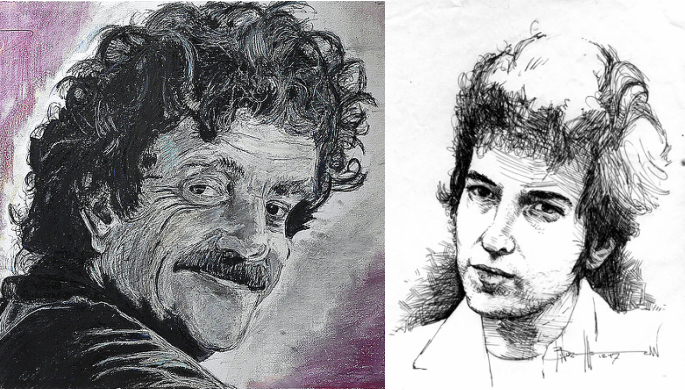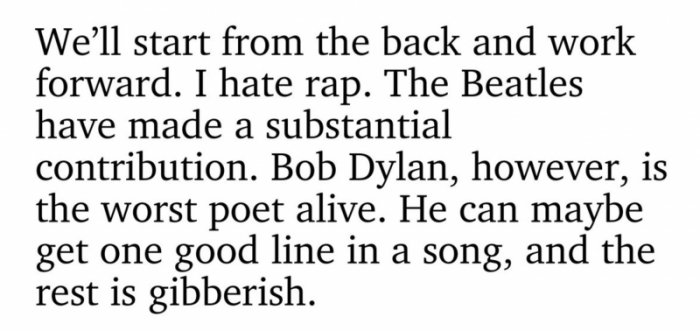
Image by Daniele Pratitand Ben Northern via Flckr Commons
As if life weren’t fraught enough, we’re barreling toward the 10th anniversary of author Kurt Vonnegut’s death.
So it goes.
Several years before he died, Vonnegut penned an essay called “Knowing What’s Nice,” in which he stated:
If I should ever die, God forbid, let this be my epitaph: ‘The only proof he needed for the existence of God was music.’
“If I should ever…God forbid…”
Bless his cranky humanist heart, if that isn’t nice, I don’t know what is.
Those outside the inner circle can only speculate as to whether his remains rest eternally beneath his preferred epitaph. Their whereabouts are not a matter of public record. As one Internet wag surmised, he “probably didn’t want some vandal sonofabitch writing Everything was Beautiful and Nothing Hurt on it.”
The widely circulated Armistice Day passage from Vonnegut’s novel Breakfast of Champions supports the notion of music as something he revered universally:
What else is sacred? Oh, Romeo and Juliet, for instance. And all music is.
In reality, the amateur clarinet player’s ear was a bit more discerning:
I hate rap. The Beatles have made a substantial contribution. Bob Dylan, however, is the worst poet alive. He can maybe get one good line in a song, and the rest is gibberish.
So he told Hustler in 1991, in response to a question about his musical tastes. Never did get around to telling the interviewer what he actually liked. According to his daughter, Nannette, the list would’ve included Dave Brubeck, the Statler Brothers, and The Music Man soundtrack.

Vonnegut didn’t live to see Dylan win the Nobel Prize for Literature last year, but several commentators exhumed his dismissive quote to underscore that not everyone was happy to see a singer-songwriter awarded such a prestigious literary prize.
Meanwhile, Dylan’s fans are not waiting for him to die to talk about the ways in which his music has helped them navigate through life, much as the jazzmen Vonnegut saw playing live in Depression-era Indianapolis transported him to a better place:
…what music is, I don’t know. But it helps me so.
Fans have created eleven playlists inspired by Vonnegut on the music sharing site 8tracks, including one that features Dylan’s A Hard Rain’s A‑Gonna Fall. (“Perfect for capturing Vonnegut’s vibe” enthused one innocent young commenter.)
Related Content:
Kurt Vonnegut Explains “How to Write With Style”
In 1988, Kurt Vonnegut Writes a Letter to People Living in 2088, Giving 7 Pieces of Advice
Ayun Halliday is an author, illustrator, theater maker and Chief Primatologist of the East Village Inky zine. Follow her @AyunHalliday.


Vonnegut is one of the great American pop writers of the last half of the 20th century. Bob is the most influential artists of the second half of the 20th century. If not Bob, who?
Difficult to tell how good a poet one is by the songs they write. Entirely different disciplines. In song, the writer needs to make space for the music and melody. In poetry, one uses (and counts on) the silence. The way the words (sounds, syllables) are allowed to breathe within the open air of poetry, is very different than the confines and business (read: busy-ness) of lyric writing.
For instance, I fell in love with Leonard Cohen’s poetry, long before I paid any attention to (or even knew about) his folk career. And in doing so, I must admit, I don’t care for 90% of his songs. They, to me, lose something. I’ll take a concise, biting, revelatory five-line gem of poem over almost any song of his any day.
And I’ll add that I’ll agree with Vonnegut in this sense; Dylan was more than willing to use lazy rhymes and gibberish to eventually get to a pay-off, as (or more) often than he was efficient, dense. or consistent in the quality of his lines.
I pity someone who dismisses songs like It’s Allright Ma (I’m Only Bleeding) as gibberish, he surely misses out on something. I have read a lot of poetry, but that song for me tops anything that is written.
I well recall settling into my 14th row seat at Madison Square Garden in December 1976 for the Hurricane Carter benefit show put on by Bob’s Rolling Thunder Revue, when my brother told me to look to our right and there was Kurt Vonnegut sitting next to us.
As much as I appreciate and respect the work of Kurt Vonnegut, I would not go to him for music recommendations. The Statler Brothers?
Boy, his taste in music is not quite mine, and I sigh in regard to his capacity of overlooking some of the best lyrics, which I do regard as poetry, written in this age, like indeed It’s Allright Ma (the best!) and Desolation Row and Visions of Johanna, Tangled up in Blue and Idiot Wind and Every Grain of Sand and Jokerman, Ain’t Talkin’ and Pay in Blood and Scarlett Town, just to name a few, but maybe he was just pissed that his good books in those days of the nineties, where literature was losing its importance already, did not get as much attention… It’s sad when a great man needs to look down on another genius because of disenchantement with his own position. For me a lot of modern poetry is too chaotically abstract and lacks rhythm and rhyme (and I do not mean only end rhyme, just the beauty of sounds that make a poem sing), yet maybe that’s my failure.
Tom Waits